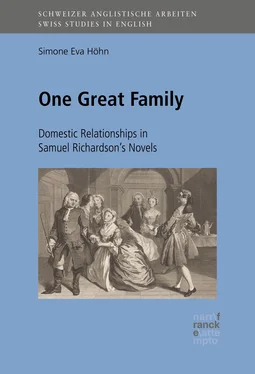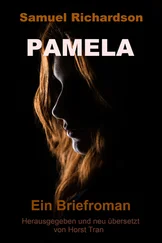Lovelace’s probing of Clarissa’s mind via her body is subject to the same paradox. If the ‘public’ testimony of the body is untrustworthy (the virgin blushes when, and because, she is seen), he must penetrate to a deeper level. In one sense, Lovelace can never reach this ‘private’ body, for while he is with Clarissa, he also constitutes her audience (perhaps another reason why he is shaken with Sally’s “aping” of Clarissa – she reminds him of his position as spectator). Indeed, as Tassie GwilliamGwilliam, Tassie has observed, he bases his boasted knowledge of women not only on his direct experience of them , but also on his experience of himself (59). Like a woman – like the virgin who blushes in public but not in private – he was once “bashful”. Paradoxically, however, this self-knowledge does not help him with Clarissa. If she is like him – like the other women he thinks he understands – then she is not the paragon he took her for, but if she is unlike him, then the ‘essence’ of her being may well be beyond his comprehension.
Furthermore, like MandevilleMandeville, Bernard, Lovelace has defined the set-up of his testing of Clarissa in such a way that he can never prove the existence of that virtue he appears to be looking for. Having associated ‘love’ with ‘conquerability’ and ‘virtue’ with ‘coldness’, Lovelace has made it impossible for Clarissa to prove herself both truly virtuous and capable of love – though she must do both to satisfy him. If she responds with the least show of desire, then her virtue must be fake, mere masquerade – identical with the hypocrisy which, he thinks, all his previous victims have displayed. If she does not respond, however, the essence or ‘heart’ of her being (cf. 1.3) must indeed, as Mowbray suggests, “be either iron or marble” (1382), rather than part of a living body. Clarissa’s death, which obviates all difference between public display and private motive/emotion, may be the only definite answer to this dilemma. It is only then, too, that her body might be opened – something which she expressly forbids in her will (1413) but which Lovelace desires. In his temporary madness, he demands Clarissa’s heart as a physical token that his “charmer’s” essence is neither cold marble nor living desire. A final irony of Lovelace’s attitude is that this search after an ‘essence’ – either ‘cold’ or ‘desiring’ – locates Clarissa’s virtue in the body itself rather than in her mind’s control of her impulses. Searching for the ‘truth’ of sexual desire, he becomes oblivious to the truth of her virtuous intentions.
Lovelace is not alone in his troubled attitude to the relationship between body and mind. Not long after he has tricked Clarissa into living at Mrs. Sinclair’s brothel, he invites his four friends, Belford, Belton, Mowbray and Tourville, to see her. The following day, Belford writes a letter to urge Lovelace to marry Clarissa: “I write to tell you that we are all of one opinion with regard to her ; which is, that there is not of her age a finer lady in the world, as to her understanding” (555). His commendation of Clarissa’s intelligence is followed by “ poorer praise” of her beauty. At the centre of the letter comes a strangely disturbing passage which, judging from later letters by Mowbray, is far from anything he could have written:
You may think what I am going to write too flighty; but, by my faith, I have conceived such a profound reverence for her sense and judgement that, far from thinking the man excusable who should treat her basely, I am ready to regret that such an angel of a lady should even marry. She is, in my eye, all mind: and were she to meet with a man all mind likewise, why should the charming qualities she is mistress of, be endangered? Why should such an angel be plunged so low as into the vulgar offices of domestic life? Were she mine, I should hardly wish to see her a mother unless there were a kind of moral certainty that minds like hers could be propagated. For why, in short, should not the work of bodies be left to mere bodies? (555)
Belford’s flight of fancy is indeed strange. In the very letter designed to urge his friend to marriage, he regrets that “such an angel of a lady should even marry”. In this paragraph, Clarissa’s body seems strangely divided from her mind.4 At the same time, it is Belford’s “eye” that perceives her “mind”; confusingly, Belford mixes up the terms belonging to the body and mind respectively even while trying to keep separate Clarissa ’s body and mind. For Belford, the metaphor of the “angel” materialises into a ‘literal’ truth: like the spirits she resembles, Clarissa has no body, or at most one that seems foreign to her essential quality. Insofar as it exists at all, it exists as a threat: the mother’s body that reproduces mankind can kill her in childbed. In his first (extant) letter to Lovelace, he had urged him to marry to continue the family line; according to Belford’s original argument, “the vulgar offices of domestic life” are precisely what Clarissa is needed for (cf. 501–2). This new letter suddenly problematizes this. The body is attached to “vulgar offices” and connected to the uncertainty of life; it cannot be trusted to reproduce its possessor’s qualities. In Belford’s vision, the maternal body is powerless and endangered, a striking contrast to the harmonious and harmony-inducing mother’s body presented in Grandison ’s breast-feeding scene (cf. 3.1), or to the repeated claim in Grandison that all women who can find a good husband should become wives and mothers, since “a woman out of wedlock is half useless to the end of her being” (1:25).
The paragraph stands in strange contrast, as well, to the preceding passage, where Belford praises Clarissa’s “so awful, and yet so sweet, […] aspect”, her “piercing, yet gentle eye” and her “sweet smile darting through the cloud that overspread her fair face; demonstrating that she had more apprehensions and grief at her heart than she cared to express!” (555). In the passage just quoted, Clarissa’s body is infused with her mind, so that the latter can indeed be read by Belford’s “eye”. Her facial expression conceals and expresses simultaneously; even the convoluted grammar of the sentence, which makes it unclear whether it is the “smile” or the “cloud” that demonstrates the “grief at her heart”, mirrors Clarissa’s inner conflict. The passage implies a connection between body and mind that is directly refuted in the very next paragraph.
What, then, makes Clarissa’s body so threatening that Belford has to deny it? One explanation that springs to mind is the topos of the dichotomy between angel and whore. Indeed, Lovelace equals ‘woman’ with ‘conquerable’, and thus with the women he has already conquered. The reader learns that some of these have died in childbed, while others have become prostitutes, like the “little devil” Sally Martin. In these cases, the body has indeed proved murderous or tainting. Belford seems to be trying to distance Clarissa as far as possible from these other women whom Lovelace has seduced: “[I]n the article thou seekest to subdue her for, a mere sensualist of her sex […] would make a sensualist a thousand times happier than she either will or can” (556). Physical pleasure is best provided by “mere bodies”; Clarissa, “all mind”, is hardly worth pursuit on that count.5 Belford’s formulations suggest that he is, for the moment, more absorbed in his own impression of Clarissa than focussed on persuading Lovelace. Indeed, he imagines Clarissa as “his own” rather than his friend’s (or, indeed, her own): an object which can be possessed but, simultaneously, desecrated through use. It is as if there exists no space for a woman above “mere body”. Belford’s language points to the tragic conclusion of the book; Clarissa indeed never has children.
Читать дальше












